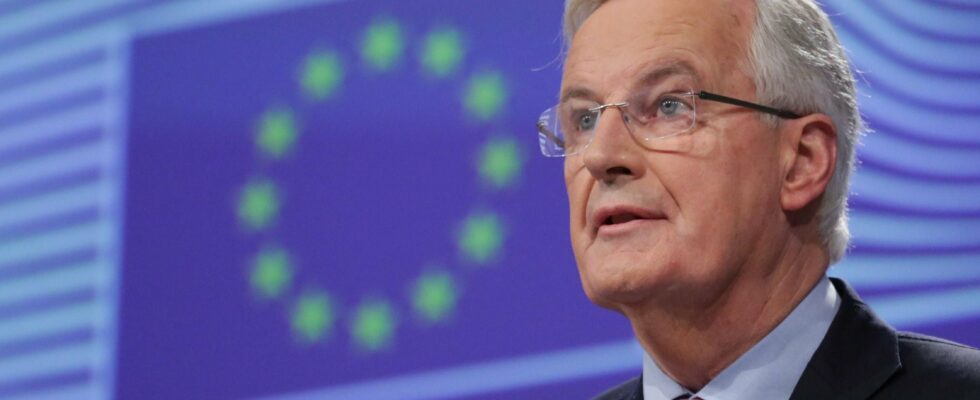Europe, here is a shared interest that could bring together the forty-something from the Elysée and the septuagenarian from Matignon in the “demanding coexistence” promised by the President to his new Prime Minister. This taste for European construction sets them apart in the French political class. Faced with Emmanuel Macron, who was inducted in 2017 to the sound of the European anthem, Michel Barnier is only the second head of government of the Fifth Republic – after Raymond Barre – to have previously held the position of commissioner in Brussels. “Here is at least one to whom we will not need to explain how things work here”, they rejoice in the capital of the Union.
“I am European, but not for just any Europe, for a useful and concrete Europe,” the former chief Brexit negotiator was nevertheless keen to clarify during his first interview on TF1. “He is not a federalist: he will be French in Brussels and European in Paris. One thing he has in common with Emmanuel Macron is that he does not want to set the Nation against Europe,” explains Sébastien Maillard, special advisor at the Jacques Delors Institute.
The first test will come quickly. Together, they will have to roll up their sleeves to reassure Brussels about the country’s budgetary situation. Of course, the appointment of the Savoyard has been welcomed throughout Europe, but difficult months lie ahead, as Paris must present its trajectory for reducing the debt to the European Commission by October 15 at the latest. “With his European track record, Michel Barnier knows that controlling the deficit must be a priority. But France must not expect indulgence [des Vingt-Six] just because she named a insider “Brussels!” warns German conservative MEP Markus Ferber.
Brussels network
The former commissioner will therefore have to fight back, but he can count on his Brussels network to listen attentively to his arguments. He knows everyone in the EU institutions, from Christine Lagarde, the head of the ECB, to Ursula von der Leyen, the head of the Commission. No fewer than three of his former close collaborators are now among the most powerful senior civil servants in the place, occupying the positions of directors general in charge of the budget, trade or even competition.
It must be said that Michel Barnier has had time to build relationships, his first major European post dating back a quarter of a century. Commissioner for Regional Policy (1999-2004), then for the Internal Market and Financial Services (2010-2014), he had his moment of glory as head of Brexit negotiations (2016-2021). Even before this last mission, a British tabloid had called him “the most dangerous man in Europe” when he regulated European finance, and in particular the City of London, after the subprime crisis.
Over the course of his fourteen years in Brussels, the former head of the Albertville Olympics has refined his method. Undaunted, always courteous, he is methodical and never deviates from his goal. His interlocutors at the time have not forgotten the legendary colour Excel spreadsheet that Michel Barnier used to whip out everywhere, including in front of Pope Benedict XVI, to present the progress of financial legislation. When he left, almost all of it was in the “adopted” column.
“In Europe, by definition, we build project majorities and negotiate constantly. He has a culture of compromise,” points out Horizons MEP Nathalie Loiseau. “He’s a mountaineer, he has a sense of climbing slowly but surely to reach the top. It’s the Barnier method, unite to build,” one of his close friends, former UMP MEP Michel Dantin, a Savoyard like him, told us during Brexit. In public, the result is not necessarily flamboyant. Michel Barnier often relies on the same anecdotes or tried-and-tested formulas. “The clock is ticking” – the clock is ticking – he hammered home, for example, in his fragile English at each press conference, when the negotiations with London were not progressing quickly enough in his eyes.
Negotiation skills
Well surrounded by a team of outstanding technical experts, he will succeed in the feat of maintaining against all odds the unity of the Twenty-Seven that London will try to undermine until the end. A success obtained by constantly traveling to the capitals, by treating small and large member states equally and by constantly informing diplomats and politicians of the state of the discussions. No cracks will ever appear in the European camp.
These negotiating skills will be valuable in his new role in Paris, including on European issues. The second von der Leyen Commission is about to begin its term. Strategic autonomy, industry, defense, common agricultural policy, France wants to influence reforms. It has an interest in speaking with one voice to achieve this… No difficulty in waiting between the Prime Minister and Thierry Breton. Michel Barnier has appreciated the current Commissioner since the 1980s and regularly popped in on his floor during his visits to Brussels. In the EU capital, no one expects him to ask to take part in the European Council in place of Emmanuel Macron.
On the other hand, Europeans will closely follow his positions on migration issues. In 2021, they choked when, as a candidate in the LR primary, he advocated a unilateral moratorium on immigration and the establishment of a “constitutional shield” that would allow France to exempt itself from European law. But would they react the same way today? “The European consensus on immigration is increasingly firm and the French president is not lax on this subject either,” notes a diplomat. With a right-wing Prime Minister, France is now in tune with the majority of European countries.
.
